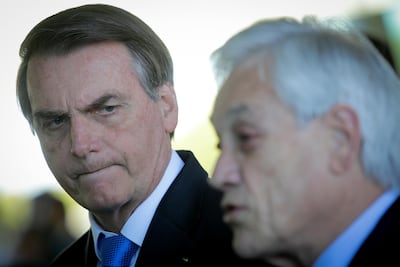Brazilian President Jair Bolsonaro said on Wednesday that Amazon countries in South America would meet in September to discuss protecting and developing the rainforest region, which has been hit by weeks of devastating fires.
Mr Bolsonaro also continued a deeply personal dispute with French President Emmanuel Macron, accusing him of portraying himself as “the one and only person" concerned about the environment.
His remarks were in response to international accusations that on his watch, the weakening of environmental protection in Brazil allowed farmers, developers and others to set more fires this year to clear land, much of it already deforested.
They also highlighted his government’s contention that some international offers of help to fight the fires were an infringement of Brazilian sovereignty over the region.
Mr Macron and other European leaders say the fires in the Amazon require a global response because of the ecosystem's critical role in absorbing carbon dioxide from the atmosphere.
He accused Mr Bolsonaro of lying to him about his commitments to biodiversity, prompting the Brazilian to accuse the French leader of evoking his country’s colonial past.
On Wednesday, he said Germany and France had tried to buy Brazilian sovereignty.
The G7, hosted last weekend by France, pledged $22 million (Dh80.8m) to help protect rainforest in the Amazon, but Mr Bolsonaro turned it down.
He said he would accept bilateral aid and that Chile was sending four firefighting planes. Britain has pledged $12m and Canada has offered $11m.
Mr Bolsonaro said all Amazon nations except Venezuela would meet in September “to come up with our own unified strategy for preserving the environment and also for sustainable exploration in our region".
He made the announcement after meeting Chilean President Sebastinan Pinera in the Brazilian capital, Brasilia.
South American countries that contain Amazon rainforest “have sovereignty over the Amazon that needs to be recognised always", Mr Pinera said.
A regional conservationist said the ideal scenario would be if the Amazon countries agreed on how to preserve the region and received strong international support to do it.
"Sovereignty is certainly a fundamental issue here," said Roberto Troya, regional director for Latin America and the Caribbean for the World Wildlife Fund conservation group.
But Mr Troya said the issue could have a harmful effect “if used as a shield to isolate and distort the reality of what’s going on on the ground".
Six former Brazilian environment ministers on Wednesday met Rodrigo Maia, president of the lower house of Congress, to demand stronger protection for the environment.
The ministers said Brazil should accept international aid to fight the fires and accused Mr Bolsonaro's government of dismantling environmental institutions, the G1 news website reported.

Porto Velho, the capital of Amazon state of Rondonia in Brazil, has been heavily affected by smoke from the fires.
Resident Graciela Martinez said it was important for the world to preserve the Amazon but she questioned the international concern and aid offers this year, saying fires were common in the past.
“I suspect that there’s some kind of hidden interest behind it, because we had never seen this before," Ms Martinez said.
"We’ve had bigger fires and it’s only now that we have this worldwide ruckus."
Another resident, Geane Pereira de Souza, said the Brazilian government had not done enough to protect the rainforest and that international help was needed.
“Any help is good and welcome,” she said. “The Amazon means everything to me. Some say it’s like the heart of the world.”
About 60 per cent of the Amazon region is in Brazil. It also covers parts of Bolivia, Colombia, Venezuela, Ecuador, Peru, Guyana, Suriname and French Guiana, an overseas region of France.
Bolivia, which shares a border with Brazil, is also struggling with fires, many of which got out of control in high winds, after being intentionally set during an expansion of farming.
The fires started in July and have burnt 18,000 square kilometres in the Bolivian Amazon and Santa Cruz, the country’s agro-industrial centre, according to satellite images assessed by Bolivian environmental group Fundacion Amigos de la Naturaleza.
President Evo Morales said up to 30 per cent of the burnt area had been intact forest, while the rest was set on fire in the annual cycle of land-clearing.
Meanwhile, there are growing fears in Brazil that lingering smoke in the Amazon is causing increased respiratory problems, particularly among children and the elderly.
The number of people treated for respiratory problems increased sharply in recent days at the Cosme e Damia Children’s hospital in Porto Velho.
More than 83,000 blazes have been documented by the country’s National Space Research Institute since the start of the year.
That is a 77 per cent increase over the same period last year. About half of the fires occurred in the Amazon region, most of them in the past month.
The state hymn of Rondonia takes pride in the region’s famously beautiful skies.
“Blue, our sky is always blue,” it says. “May God keep it unrivalled, crystal, pure and always keep it that way.”
Some clouds and a blue sky were partly visible on Wednesday, but then the haze settled again.
Fires usually occur about August, but this year people started them earlier, Mr Troya said.
“Maybe the rule of law is not necessarily there. Probably people feel that they can do it without any consequence.”










